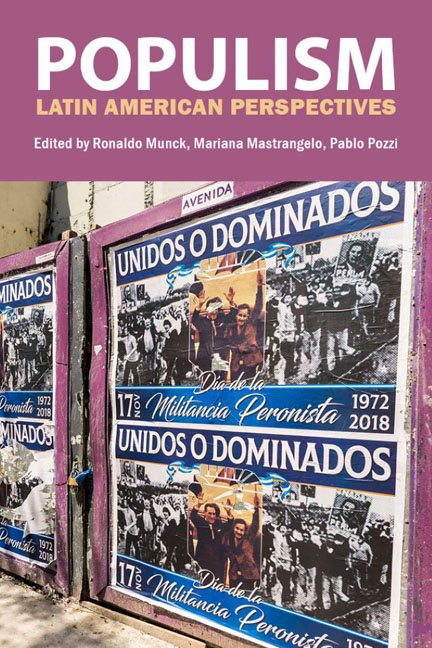Book contents
- Frontmatter
- Contents
- Abbreviations and acronyms
- Foreword
- Introduction
- 1 Populism in Latin America: development, democracy and social transformation
- 2 Peronism in Argentina: left or right?
- 3 The populist left in Chile: socialists and communists from 1936 to 1973
- 4 The left and the Workers’ Party in Brazil: a party between populism, social policies and the popular vote
- 5 Brazil, Bolsonaro and populism of the right
- 6 Political dilemmas of the government of López Obrador: between populism, democracy and the left in Mexico
- 7 The Bolivarian process in Venezuela: socialism, populism or neoliberalism?
- 8 Populist responses to crises of market democracy: the case of Bolivia’s Evo Morales
- 9 Ecuador: populism and the 2007– 17 political cycle
- 10 The Nicaraguan crisis and the mirage of left populism
- 11 Populism and the right in Latin America
- 12 Populism and the left in Latin America
- Afterword: a tale of two “people”: national popular and twenty-first-century Latin American populisms
- Contributors
- Index
11 - Populism and the right in Latin America
Published online by Cambridge University Press: 23 January 2024
- Frontmatter
- Contents
- Abbreviations and acronyms
- Foreword
- Introduction
- 1 Populism in Latin America: development, democracy and social transformation
- 2 Peronism in Argentina: left or right?
- 3 The populist left in Chile: socialists and communists from 1936 to 1973
- 4 The left and the Workers’ Party in Brazil: a party between populism, social policies and the popular vote
- 5 Brazil, Bolsonaro and populism of the right
- 6 Political dilemmas of the government of López Obrador: between populism, democracy and the left in Mexico
- 7 The Bolivarian process in Venezuela: socialism, populism or neoliberalism?
- 8 Populist responses to crises of market democracy: the case of Bolivia’s Evo Morales
- 9 Ecuador: populism and the 2007– 17 political cycle
- 10 The Nicaraguan crisis and the mirage of left populism
- 11 Populism and the right in Latin America
- 12 Populism and the left in Latin America
- Afterword: a tale of two “people”: national popular and twenty-first-century Latin American populisms
- Contributors
- Index
Summary
INTRODUCTION
Populism is a slippery concept, not least due to its use as a catch-all term for widely distinct political projects, extinguishing many of their differences. In the past I have argued (Cannon 2018) that we need to view populism as an academic analytical tradition rather than empirical fact, emphasizing instead the left/right dichotomy as the essential conceptual tool to help order, understand and explain political phenomena. In this chapter I develop this work further, using Bobbio's (1996) conception of the left/right dichotomy as a dyad, shaped by historical consensus and rupture centred on (in)equality. As Noël and Thérien (2008) argue, consensuses emerged between left and right on state development and welfare regimes in the post-Second World War period, and more recently, I argue here, around “progressive neoliberalism” (Fraser 2017) in the post-Cold War period. These global consensuses between left and right can be loosely mapped onto the Latin American experience, as respectively the postwar “state developmentalist” or classic “populist” phase, and the more recent phase of left-oriented “pink tide” governments. These have both been contested by right-oriented administrations, viewed in the dominant literature as respectively “neo-populism” in the 1990s (Weyland 1996, 2003; Roberts 1995), associated with figures such as Menem in Argentina, Collor in Brazil and most notably, Fujimori in Peru, and a more recent radical right populism, associated primarily with Jair Bolsonaro in Brazil. In both these literatures, there is strong emphasis on the autonomy of the political from ideology, allowing the concept to “travel” temporally and spatially. In this chapter, I review both these instances of right-wing populism in Latin America consecutively, using a more contextually sensitive approach to these phenomena, which is best equipped to appreciate their distinctions, while emphasizing what they share. Such an approach needs to include, as Munck recommends in the introduction to this volume, the problematics of “development, democracy and social transformation”. Taken from this perspective, while each right-wing populist regime in the region is shaped by the distinct temporal and spatial circumstances in which it emerges, what they share is the right's central historical objective of maintaining and deepening social hierarchy, not just at the level of class, but also in gender, ethnicity and sexuality.
- Type
- Chapter
- Information
- PopulismLatin American Perspectives, pp. 187 - 206Publisher: Agenda PublishingPrint publication year: 2023

